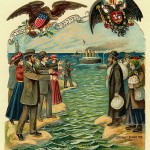Today in class students and I discussed Abraham Lincoln’s Second Inaugural Address and the sixteenth president got me wondering about how we interpret providence and even whether we should.
At the end of the speech, Lincoln argued that the Civil War was an instance of divine judgment on the United States for slavery:
If we shall suppose that American Slavery is one of those offenses which, in the providence of God, must needs come, but which, having continued through His appointed time, He now wills to remove, and that He gives to both North and South, this terrible war, as the woe due to those by whom the offense came, shall we discern therein any departure from those divine attributes which the believers in a Living God always ascribe to Him? Fondly do we hope — fervently do we pray — that this mighty scourge of war may speedily pass away. Yet, if God wills that it continue, until all the wealth piled by the bond-man’s two hundred and fifty years of unrequited toil shall be sunk, and until every drop of blood drawn with the lash, shall be paid by another drawn with the sword, as was said three thousand years ago, so still it must be said “the judgments of the Lord, are true and righteous altogether.”
But how did Lincoln know that the Civil War was not an instance of divine judgment for the colonists’ rebellion against a lawful government (read: the United Kingdom, a Christian government to boot)?
On one side is the issue of national sin and whether political rebellion is more sinful in a Romans 13 way than slavery. But the deeper issue, for me today in class anyway, was whether reading divine providence as Lincoln tried to do is legitimate even for Christians (and if some can question President Obama’s profession, what do we do with a president who made none?).
Protestants confess and believe that God’s word is the place to go to try to discern God’s ways. Since the canon was closed somewhere in the first or second centuries after Christ, readers wanting to know God’s thoughts about nineteenth-century America from Scripture would be seriously disappointed. The apostles, God’s inspired writers, were hardly clairvoyant and did not know about any kind of special relationship between the United States and God or whether he would judge some republic created from former British colonies. So to know God’s purposes or will apart from Scripture is impossible (for a Protestant).
In which case, any appeal to divine providence like Lincoln’s goes into territory that is closed thanks to the limits of divine revelation. As appealing as it may have been to find meaning in such a brutal war from thinking that God was executing his wrath, if Lincoln were really as thoughtful, profound, and biblical as his fans say he was, he should have left God out of the Second Inaugural.
(Image)












